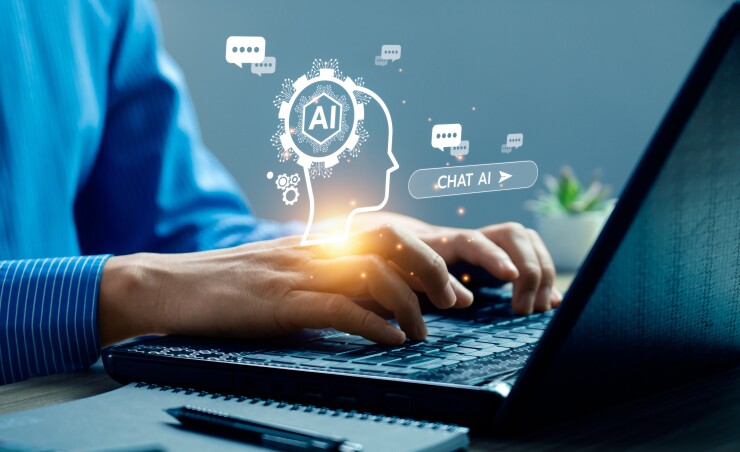The job market in the U.S. has seen a slight pullback in the months following President Donald Trump's return to office, leaving hiring managers feeling empowered and eager to embrace new recruitment strategies — including AI-powered tools — to select only the best candidates for a shrinking number of open positions.
Data from the U.S. Bureau of Labor Statistics'
Layoffs were more pronounced across the same period, especially in the government sector, with 78,000 in January and 99,000 in February. Trump's orders saw
"Over the last couple of years, employees have dealt with many rounds of layoffs across other industries," Julia Toothacre, career coach and strategist at Resume Templates, told Employee Benefit News. "We don't want employees to feel unsafe at work, or like they're going to lose their job, but to see what's happening on the government side, that has really shaken people up."
Read more:
Executives seeking to assuage these doubts and put employees at ease are doing so by using employee feedback as a catalyst for developing more effective benefit packages.
The ebbs and flows of remote work opportunities are one example that has seen benefit leaders launch new programs like reimbursements for travel expenses or more fluid office working arrangements, creating a bargaining chip for enticing new hires.Experts with professional recruitment consultancy Robert Walters say professionals across the country spend anywhere from 1% to 5% of their annual wages just on traveling to the office. Furthermore, 74% say commuting time and cost is a major factor when considering a job and a separate 60% hold that these expenditures are the most important that employers can pick up the tab for.
"As [RTO] requirements have gone from being one to two days a week to potentially three to four days a week, we're starting to see people being less and less inclined to spend that time commuting," Sean Puddle, managing director of Robert Walters, North America, recently told EBN. "There's also a portion of people who moved out of the key metro areas during COVID, and now they're suddenly required to come back to the office. That's something that could very well drive attrition issues within businesses."
Read more:
Talent managers seeking to stay ahead of the curve are rethinking best practices for approaching the interview process, doubling down on adopting artificial intelligence and even exploring underemphasized talent pools to strengthen their workforce in 2025.
Dive into more expert insights about best practices for approaching the interview process, why embracing artificial intelligence can help keep leaders in their roles longer, and other trends carrying benefit managers through 2025.

The short- and long-term benefits of a structured interview process
Many recruitment leads have a unique way of
"Every hiring manager thinks they have a special question that only they come up with that elicits some nuanced insight into a candidate," Andy Nelesen, solutions lead, talent acquisition at talent solutions company SHL, told EBN. "[But] these random 'gotcha' questions do not help out in terms of their ability to isolate the people that are likely to be high performers."
When it comes to structured versus unstructured interviews, previous research published in the
Read more:

What benefits can sway remote workers to pick up and move?
The hustle and bustle of large cities were a problem at the height of the COVID-19 pandemic, driving many to smaller, more remote locations for fewer health risks. Officials of a small Kansas town are hoping that the remote work force will make the same migration for a host of new reasons.
"You don't get people to move from the city unless you can provide some sort of better quality of life," Devin Johnson, the mayor of Neodesha, Kansas, a small town with roughly 2,000 residents, and a native of the area, told EBN. "But they'd already seen how life could be in small towns [during COVID], so we just had to ask ourselves: 'How do we take advantage of this long-term?'"
Taking advantage of the trend drove Johnson and his colleagues to
Read more:

Embracing AI can help keep benefit leaders employed longer
Benefit leaders aren't shying away from the promised automation of artificial intelligence, adopting tools like chatbots and other implementations of generative AI to improve human resource duties. Keeping with the times can mean avoiding replacement by newer waves of talent.
"I have to stay up on what's new; if I don't, I'll get replaced by somebody who will," Brooke Shreeve, chief people officer at Weave, a healthcare payments software company, told EBN. "I need to make sure I'm embracing new technology."
Shreeve spearheaded the implementation of an AI tool within Weave that helped analyze the roughly 850 responses it gathered as part of its annual employee experience survey.
Read more:

Playing to the strengths of Gen Z talent can yield new rewards
Recruiting Generation Z — the latest wave of talent entering the workforce — can feel like navigating a new cultural landscape.
Born between the mid-1990s and early 2010s, this generation has distinct workplace expectations, but at their core, they seek the same things most professionals do: meaningful work, career growth, and an environment where they feel understood. The key to attracting and retaining Gen Z talent is not about reinventing the wheel but exploring how employers and employees mutually benefit from Gen Z's ways of being, creating a win-win.
While Gen Z is often associated with their digital-first lifestyle, their fundamental workplace desires are familiar: fair pay, enjoyable work, trust in leadership, and strong colleagueship.
Read more:

EXPLR is helping maintain the pipeline of STEM professionals
Founders of EXPLR, the subscription-based streaming video and curriculum services, have been working since 2003 to offer high schoolers and other professionals a pathway into a career in STEM.The platform offers skills-based learning and development for students in grades 5-12, and global-based curriculum and professional development tools for teachers. EXPLR hosted its second annual National STEM Festival in March, drawing in sponsors like Google, Nokia and Autodesk.
"How do we create a STEM movement so everybody sees themselves in STEM and understands the importance in our everyday lives?" Jenny Buccos, co-founder and CEO of EXPLR, told EBN. "That's where we come in, because of our digital expertise and a whole free digital companion, to get kids into the STEM pipeline."
Read more:





